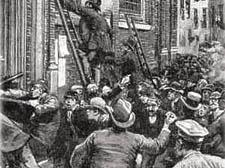|
|
 |
| |

Chartists face up to the authorities in 1840 |
How the Chartists forced the Royal Family to flee London
Were gender and race issues hot topics in the 19th century? Keith Flett reviews a readable account of the world’s first
working-class party
Chartism: A New History. By Malcolm Chase. Manchester University Press £18.99
THE Chartists, the world’s first working-class party, campaigned for the kind of Parliamentary democracy that today we take perhaps too much for granted, from 1837 to 1858. Their tactics ranged from huge petitions to Parliament demanding the vote to attempts at armed insurrection and general strikes.
Writing the history of such a vast movement has proved a challenge. The first history, written by Robert Gammage in 1854 – and still in print, was an attempt to argue about the direction of Chartism while it was still in existence. The 20th century saw more efforts at a history of Chartism, but the scale and extent of the movement has always presented problems.
Malcolm Chase has written the first 21st-century history of Chartism and it is a highly creditable and readable effort. He covers the latest research on Chartism, and addresses issues that will be of interest to a modern audience, such as where the Chartists stood on matters of gender and race and how they dealt with the anti-semitism that pervaded Victorian England.
His decision to weave between a narrative history and cameos of the lives of individual Chartists gives the reader a feel both for the big picture and what it would have been like to be a Chartist activist.
London posed a problem for the Chartists and continues to be a source of debate among Chartist historians. It was the London Working Men’s Association in 1837 that formulated the six demands of the Charter which included adult male suffrage and a secret ballot. All were agreed down the years – although all women did not get the vote until 1928 – except for one, the call for annual Parliamentary elections.
Some historians of London Chartism have seen it, led by William Lovett, as representing the moderate constitutional wing of the movement, compared to those who preferred direct action and perhaps violence. It is a false dichotomy; the Chartist slogan was “peaceably if we may, forcibly if we must” and even Lovett was jailed for his pains.
However, Chartism was perhaps stronger in the provinces for its first 10 years of existence. By 1848, the year of revolutions, the focus had moved to London and Malcolm Chase deals extensively with this period, providing useful new material.
He records, for example, that following the French revolution of February 1848, the occupants of the cheap seats at Sadler’s Wells forced the performance to stop and called for the Marseillaise to be played.
On Monday April 10 1848, the Chartists marched from locations across London to Kennington Common for a meeting before presenting a petition calling for the vote to the Commons. As Chase notes, the government prepared for a “full-scale uprising” and the Royal Family decamped to the Isle of Wight.
At the British Museum, stones were carried to the roof ready to hurl at Chartists who might storm it. They had no such plans, of course. Even so, Chase somewhat underplays the strength of the Chartist threat on that day.
When the Chartists tried to march over Blackfriars Bridge, despite heavy rain, they managed to break police lines and only dispersed when mounted soldiers drew their sabres in Bridge Street.
Chase is very good, however, on the revolutionary months that followed April 10, ending with the breaking up of an armed conspiracy in London in August 1848 and the arrest of leading Chartists, including the leader of London Chartism, William Cuffay, who was a black tailor, descended from slaves.
The battle for democracy, both political and social and economic, remains relevant in the world today.
Malcolm Chase’s book gives an important insight into the origins of that battle with the Chartists. Pester your local bookshop to stock some copies! |
| |
|
 |
|
| |
 |
|
 |
|



